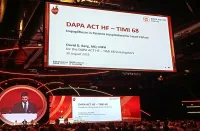A new ESC/EAS Focused Update on lipid management, released at ESC Congress 2025, provides fresh guidance on how best to reduce cardiovascular risk in patients. Central to the update is the recommendation to use new cardiovascular risk prediction algorithms, designed to help clinicians make more precise treatment decisions.
The algorithms, SCORE2 and SCORE2-OP, already featured in the ESC Prevention Guidelines, estimate a patient’s 10-year risk of both fatal and non-fatal cardiovascular events. This means they predict not only the risk of dying from cardiovascular disease (mortality) but also the likelihood of living with its disabling effects (morbidity). While SCORE2 is applicable across adults, SCORE2-OP is specifically tailored for people aged 70 to 89 years, allowing for more accurate risk assessment in older populations.
The update was prepared by an international expert panel chaired by Prof François Mach (Geneva University Hospital, Switzerland), Prof Jeanine Roeters van Lennep (Erasmus MC University Medical Center, Netherlands), and Dr Konstantinos Koskinas (Bern University Hospital, Switzerland).
Combining the growing knowledge of treatment benefits with improved risk prediction, more patients can receive the right therapies earlier. This approach has the potential to save many lives across Europe and beyond.
The update highlights new evidence for statin therapy in groups at elevated cardiovascular risk:
- Patients with HIV (aged 40+) – Statins are now recommended regardless of cardiovascular risk level. This follows results from the REPRIEVE trial, which showed a significant reduction in cardiovascular disease among patients given a statin over five years. People living with HIV face a two-fold higher risk of atherosclerotic cardiovascular disease (ASCVD) compared to the general population.
- Cancer patients at high risk of chemotherapy-related cardiovascular toxicity – Statin therapy should be considered in patients treated with anthracycline-based chemotherapy (commonly used in breast cancer and lymphoma). At higher doses, these drugs can cause heart failure in up to 20% of patients within five years. Evidence from four trials suggests statins can protect against this damage.

Statins are safe, effective, and cost-efficient drugs that have prevented cardiovascular disease for decades. New benefits of these drugs are still being discovered, particularly in groups like patients with HIV and those undergoing cardiotoxic cancer treatments. There are many effective options—statins among them—to reduce cardiovascular risk. Used in combination, these therapies can deliver even greater benefits for patients.
The Focused Update reviewed evidence published since 2019 on supplements and vitamins for lowering LDL cholesterol. No supplement or vitamin was found to be both safe and effective in reducing cardiovascular risk.
Many patients hesitate to take statins, often due to misinformation online, and instead turn to supplements. But this review showed no supplement provides a meaningful benefit. The guidance instead reaffirms lifestyle recommendations: a diet low in saturated fat, rich in whole grains, vegetables, fruit, and fish, can help lower LDL cholesterol.
Beyond statin use, the Focused Update also provides recommendations on newer therapies and settings:
- Bempedoic acid – A new LDL cholesterol-lowering drug, useful for patients who cannot tolerate statins.
- Lipid-lowering therapy after acute coronary syndromes – Reinforced guidance on intensifying lipid management to improve patient outcomes.

The new ESC/EAS Focused Update reflects advances in cardiovascular risk prediction and broadens the role of statins to patients with HIV and those at risk of chemotherapy-related heart damage. It also highlights the lack of benefit from supplements, highlights newer therapies, and strengthens dietary recommendations. Taken together, these updates aim to equip clinicians with evidence-based strategies to better prevent and manage cardiovascular disease in diverse patient groups.

Source: ESC
Image Credit: ESC
References:
Mach F et al. (2025) 2025 Focused Update of the 2019 ESC/EAS Guidelines for the management of dyslipidaemias: Developed by the task force for the management of dyslipidaemias of the European Society of Cardiology (ESC) and the European Atherosclerosis Society (EAS). European Heart Journal.










